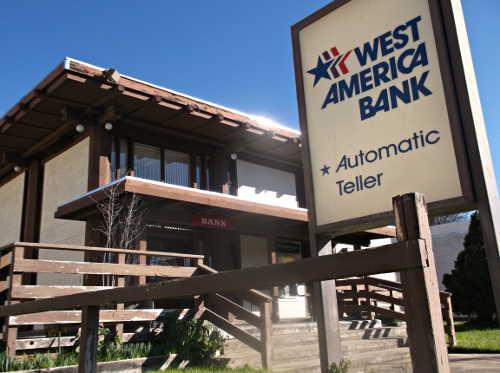
UPPER LAKE, Calif. – At Country Carpets on Main Street business in Upper Lake, owner Debbie Hablutzel has been welcoming community members stopping in not just to look at flooring, but to discuss one of the town's most pressing issues – the closure of its bank.
Westamerica Bank sent its customers a letter dated Jan. 23 that announced its intention to close the Upper Lake branch – which sits at 9470 Main St., just across from Hablutzel's shop – on April 24.
The decision shocked the community, which is pushing back against the plan to close its bank.
The united concern of residents has escalated to the point where new District 3 Supervisor Jim Steele has called a community town hall for 6 p.m. Wednesday, March 4, at the Odd Fellows Hall, 9480 Main St.
While there are a number of topics to be discussed, the bank closure is the big one, according to Hablutzel, who as president of the Upper Lake Community Council is helping rally and organize the town's response.
The matter also is under review by the California Department of Business Oversight, which has a say on the matter because Westamerica is a state-chartered bank.
While the Department of Business Oversight initially posed no objection to the closure, thanks to correspondence from community members that pointed to the bank’s importance to the entire Northshore, it is now considering a review of the matter.
“At this point we’re keeping our options open in terms of revisiting the issue,” said Special Assistant to the Commissioner Tom Dresslar.
An online petition has been set up at http://petitions.moveon.org/sign/upper-lake-bank-customers . As of Tuesday night, it had 137 signatures opposing the closure. In addition, paper petitions are making their way around the town.
One of the town's business owners, Diego Harris, stopped in at Hablutzel's shop on an afternoon last week to deliver his signed petition to her.
Harris opened his business, Diego's Gallery, eight years ago, choosing Upper Lake for reasons that included the availability of a bank.
“It's like the last thing I thought would close,” said Harris. He said when he went into the branch and found out about the closure, the staff was distressed and themselves had only just found out about the decision.
Noting he's seeing an uptick in business, Harris raised questions about why the bank would close at a time when the economy actually is starting to improve.
Hablutzel agreed, adding business at her shop has been the best it's been in six or seven years.
Harris said he uses the bank constantly. “I'm going over there right now to deposit into my checking.”
Community members don't feel that the bank has made good faith efforts to do outreach or to even give much of a time frame to respond to the decision.
The branch's small and friendly staff say they can't speak about the matter, and Westamerica officials – the regional manager as well as Robert Thorson, senior vice president and chief financial officers – did not respond to numerous messages left by Lake County news in an attempt to ask questions about the closure, including what is to happen with current staff.
Arlene Riedinger, Westamerica's vice president of Community Reinvestment Act and compliance manager, also did not respond to messages about the matter, but did acknowledge by email a second Lake County News request for the bank's Community Reinvestment Act Public File, which it must release upon request within a narrow time frame, according to federal Law. Lake County News is still awaiting receipt of the file.
The branch closure will create the need for additional travel, which takes time and money for gas, as Harris pointed out.
“It's a big hassle,” he said, explaining the need for the town's businesses – many of which are tourism-based – to have quick access to banking services and cash.
As important as the bank is to the town, Hablutzel said the matter's importance goes beyond the town itself.
“It's not just Upper Lake,” she said. She said the planned closure will affect other local communities and pointed out there are people from Nice and Lucerne – and even Lakeport – who bank at the Upper Lake Westamerica branch.
There is also an underlying sense of community pride in the Main Street bank branch. Hablutzel said there has always been a bank in Upper Lake. Or, at least, for most of the last century.
A bank history obtained by Lake County News showed that the Bank of Upper Lake opened in 1921 on the corner of Main and First streets. In 1959, the bank moved to its current location, a building built for a total cost of $52,000.
The bank became Bank of Lake County in the 1970s, and later in the same decade became Westamerica Bank. In 1988 it was sold to the Napa Valley Bank and returned to Westamerica Bank in the 1990s.
Through all of those changes – as well as the growth in credit unions and the shift in banking patterns – the physical presence of a bank in Upper Lake remained a constant.
Until now.
The process beings
The Westamerica Web site reports that the bank has $4.7 billion in assets, and is the seventh largest commercial bank headquartered in California. Westamerica Bank is a regional community bank with over 90 branches and two trust offices in 21 Northern and Central California counties.
The 2,100-square-foot Westamerica Bank building in Upper Lake is owned by Napa Valley Bancorp., which is owned by Westamerica. Napa Valley Bancorp. also owns the Westamerica branch property at 15342 Lakeshore Drive in Clearlake. The Westamerica branch at 4025 Main St. in Kelseyville is listed in the main company’s name, according to county property records.
County property records indicate that neither of the branches in Middletown or Lakeport are in company-owned buildings.
As a state-chartered bank, Westamerica is required to notify the state Department of Business Oversight of branch closure actions, according to Tom Dresslar, special assistant to the commissioner.
That's what the bank did in a letter dated Dec. 31. Riedinger notified the California Department of Business Oversight's Strategic Support Unit in San Francisco of the bank's intent to discontinue the Upper Lake branch and move services to the Lakeport branch at 150 S. Main St.
“Westamerica Bank has analyzed the impact the branch closure may have on the Upper Lake community and has determined the community will continue to have reasonable access to financial services,” Riedinger stated in the letter.
“The decision to close the branch is based on low transactional volume which does not support having a branch in the current location,” Riedinger added.
She said Upper Lake branch customers will not experience a service disruption, and would be notified 90 days before the closure occurred, noting there are a “variety of local banking choices” in the area.
“Westamerica Bank is a responsible lender and recognizes its duty to make available financial services to its communities,” Riedinger said. “A determination was made that any inconveniences this closure may have on the community will be outweighed by the fact that the new branch structure will bring a more lasting financial stability.”
By the time customers were notified of the closure in a separate letter dated Jan. 23, the Lakeport branch had moved to a new location, 650 N. Main St., Suite A, which Lake County Chamber of Commerce Chief Executive Officer Melissa Fulton described as “significantly smaller” than its previous location.
The January letter to customers noted that the closure will take effect “pending final regulatory approval.”
LaJuan Williams-Young, a spokeswoman for the Federal Deposit Insurance Corp., or FDIC, in Washington, DC, told Lake County News that the four federal banking agencies – including FDIC – require four things under Section 42 of the Federal Deposit Insurance Act when it comes to insured banking institutions closing branches.
The four requirements are to have a policy on branch closings; provide its federal regulator a 90-day advance notice of a proposed branch closing; mail to customers of that branch a notice at least 90 days before the scheduled closing; and place a conspicuous notice at the affected branch at least 30 days prior to the scheduled closing, Williams-Young said.
Williams-Young said said that the Federal Reserve Board is the primary federal regulator for state-chartered commercial bank members of the Federal Reserve System.
Customers fight back
After receiving the notice from the bank, customer and Upper Lake resident Nancy Brier began circulating a letter to local residents, businesses, organizations and leaders, urging them to fight the closure.
“This closure will be a blow to Upper Lake in particular and to all the communities on the North Shore. It is a key part of Lake County’s fledging infrastructure, and its loss will be felt widely,” she wrote.
Brier also raised concerns about the impact on the employees and customers, and the millions of dollars spent to rehabilitate the Northshore.
Fulton said she received Brier’s letter, and forwarded it to local businesses that she was aware of who were Westamerica customers, as well as Hablutzel.
She also sought community input, which she forwarded to Frank Bushnell at the Department of Business Oversight, copying the materials to County Administrative Officer Matt Perry.
Fulton, who said she had lived in the corporate world, explained that she knew that by the time the employees – much less the public – hear about actions like a branch closing, “It’s usually too late to do anything about it.”
In response to Westamerica's letter regarding the closing, the Department of Business Oversight wrote a letter to the bank, dated Feb. 13, that said Commissioner of Business Oversight Jan Lynn Owen offered no objection to the branch closure.
“In determining whether or not to object to the notice, the Commissioner considered whether the discontinuance of the branch office would have a seriously adverse effect on the public convenience or advantage,” the letter stated. “Information provided by the bank was carefully considered, and it is noted that the Bank has committed to continue to offer services, such as merchant courier service, to Upper Lake clients.”
The letter from the Department of Business Oversight also carbon copied the letter to the Federal Reserve Bank of San Francisco, Westamerica's federal regulator.
Rob Sholars, a spokesman for the Federal Reserve Bank of San Francisco, said its role in the Westamerica matter is governed by a joint policy statement between Office of the Comptroller of the Currency, Treasury, Board of Governors of the Federal Reserve System, Federal Deposit Insurance Corporation and Office of Thrift Supervision, Treasury.
Sholars referred to the same bank branch closure rules as were cited by Williams-Young. He added that in cases where a bank with interstate branches seeks to close a branch in a low- or moderate- income area, the 90-day prior customer notice must also inform customers that they can send public comment letters to the primary federal regulator, and the regulator can call a public meeting.
“The Upper Lake branch in question is not located in a low- or moderate-income area and thus the public comment process does not apply,” he said. “So long as the bank follows the technical requirements of the branch closure policy and law, the Federal Reserve cannot deny the notice or prevent the bank from closing the branch.”
Riedinger's letter to the state had identified Westamerica's Upper Lake and Lakeport branches as being in “middle-income” areas that are considered distressed or underserved, based on US Census tract information.
Sholars said the middle-income definition in this case comes from regulations contained within the Community Reinvestment Act.
Dresslar further explained that according to the Census database maintained by the Federal Financial Institutions Examination Council, the Census tract within which Upper Lake is located is middle income, with an estimated 2014 median family income of $49,268.
He explained that Upper Lake's Census tract is a distressed middle income community, which means one of three conditions are present: an unemployment rate of at least 1.5 times the national average; a poverty rate of 20 percent or more; or a population loss of 5 percent or more in the five-year period preceding the last decennial census.
County Administrative Officer Matt Perry and Supervisor Jim Steele wrote a letter, dated Feb. 18, to Bushnell of the state Department of Business Oversight voicing the county's concerns over the proposed branch closure, pointing out its service to the Northshore communities, where there are more than 7,000 residents with no other bank branch available.
Pointing to millions of dollars in public and private investment on the Northshore, the letter from Perry and Steele raised concerns that the branch closure “could jeopardize these private and public sector investments and adversely affect the community at a time when the economy is finally beginning to recover.”
The letter added, “It would benefit the bank to stay in place and promote their presence and services in the community. We’re certain the area will respond to an inclusive program.”
Perry is forwarding the petitions from Hablutzel to the state agency, and he and Fulton have been in communication to develop a strategy to address the closure proposal.
However, like community members and the media, county officials haven't been able to get anyone from the corporate offices – besides a receptionist or secretary – to take their calls about the closure.
“Nobody is calling us back,” Perry said, adding the bank didn't do any outreach to the county government over the decision.
State agency takes another look at bank closure
Thanks to the correspondence it has received from community members – as well as the online petition – the Department of Business Oversight is taking another look at the matter, said Dresslar.
One of the issues that the community's correspondence helped bring to the state's attention was that the closure wouldn't just impact Upper Lake.
The bank's rationale for the closure – as well as its assertions that the impact would be minimal – was based only on concerns about Upper Lake, not the surrounding communities, Dresslar said.
He said the bank management said public transit was available to get the elderly and disabled to Lakeport. The state also was told that residents of Upper Lake already typically travel to Lakeport for grocery shopping, health care and other services.
In addition, the bank reported to the state that many of Upper Lake's business owners were sole proprietors who already traveled around the county and also had addresses outside of Upper Lake, thus its judgment that the branch closure wouldn't have a significant impact.
As a result, all of the Department of Business Oversight's analysis was based on the impacts on Upper Lake alone, Dresslar said, adding that concern about the wider community impacts has led the agency to consider reopening the matter.
Dresslar said the community correspondence has been sent to the department's point person on the review of the bank closure, with the request that they make an assessment of whether to reopen the discussion.
While he didn’t have a date for when that would happen, he said it will happen quickly. “It would definitely be before the scheduled closure.”
Northshore residents who emphasize the importance of having a physical bank location illustrate key points found in a report released by the Federal Deposit Insurance Corp., or FDIC, on Feb. 19.
The FDIC study found that, “despite the increased use of online and mobile banking, brick-and-mortar banking offices continue to be the primary means through which FDIC-insured institutions deliver financial services to their customers.”
FDIC-insured institutions operated 94,725 banking offices as of June 2014, a decline of just 4.8 percent from the all-time high of 99,550 offices in 2009, according to the study.
Four main factors, according to the study, have influenced the number and distribution of banking offices over time: population growth, banking crises, legislative changes to branching laws, and technological innovation.
“In terms of technological change, there is little evidence that the emergence of new electronic channels for delivering banking services has substantially diminished the need for traditional branch offices where banking relationships are built,” the report said.
While there have been a number of changes in the banking industry in recent decades, the 2013 FDIC National Survey of Unbanked and Underbanked Households, visiting a teller remains the most common way for households to access their accounts.
However, the report also showed that Upper Lake's planned branch closure is indicative of a larger pattern in California, which is one of 15 states that have lost bank branches in the 1987 to 2014 time period.
Fulton said that community action makes a difference in situations like this. “If the people speak up loud and clear, they can make a difference,” she said. “We’ve seen that happen many times.”
Hablutzel pointed out that if customers have to go to Lakeport to do their banking, they're likely to choose another bank entirely.
“If they stay, we'll continue to put up with them,” she said.
Email Elizabeth Larson at This email address is being protected from spambots. You need JavaScript enabled to view it. . Follow her on Twitter, @ERLarson, or Lake County News, @LakeCoNews.












